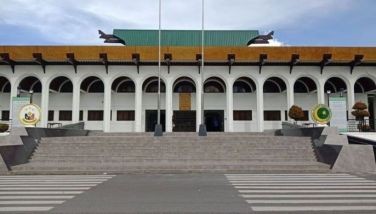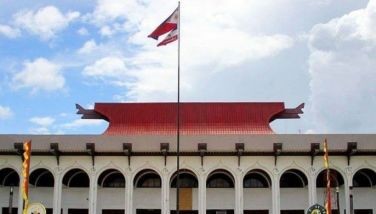The long journey to peace

The Bangsamoro Agreement, trumpeted as a breakthrough settlement of the 50-year-old Philippine Government-Moro rebels conflict in Mindanao, is yet waiting for resolution, still following a paper trail from the Office of the President to Congress, then probably the Supreme Court. And then, a plebiscite is to be conducted to determine if the people in the conflict areas will approve the signed agreement.
In a recent speech delivered before the Rotary Club University District Manila — the second oldest Rotary Club Chapter in the country — Saeed A. Daof congratulated the Philippine panel of peace negotiators headed by Prof. Miriam Coronel-Ferrer, and MILF Chairman Al-Haj Murad Ibrahim, Chief MILF Peace Negotiator Mahoghar Iqbal and the MILF team of peace negotiators, for their tenacity, patience, and determination in successfully concluding a formal peace agreement after 15 long years of off-and-on peace talks.
Daof made some suggestions that may be considered — in case it is not yet late in the day — for inclusion in the Bangsamoro Basic Law which he believes could help boost public support of the GPH-MILF peace accord as follows:
1. The affirmation of the parties to recognize the sovereignty, territorial integrity, and Constitution of the Philippine Government.
2. Recognition of the Autonomous Region of Muslim Mindanao (ARMM), which is composed of the provinces of Basilan, Sulu, Lanao del Sur, Maguindanao, Tawi-Tawi, and the city of Marawi and other parts of Mindanao, which may be included in the proposed Bangsamoro territory as integral parts of the territory of the Philippines.
3. Recognition of the Charter of the Autonomous Region of Muslim Mindanao or an amended ARMM Charter as the basis of the political authority and governance in the region in lieu of creating a Moro Sub-State or whatever name it is called, to prevent the possible clamor of other regions of the country for the creation of their own sub-states.
4. Recognition that both Muslims and non-Muslims have the right to protest and air their claims and grievances against the Philippine government, but such protest should be done through peaceful and non-violent means.
5. Recognition of the urgent need for in-depth studies about the possible implications and consequences concerning specific agreements in areas involving governance–sharing, resource– sharing, international relations, socio-economic development, integration and culture of peace development, and international loans that may require sovereign loan guarantees, floating international bonds, and leasing of public lands, among others.
6. Recognition of the need for full cooperation towards the prevention and suppression of the birth or growth of separatist and terrorist groups in the region.
7. Recognition of the explicit renunciation of the secessionist stance and independence demand by the MILF.
8. Declare, affirm, and recognize the need for full cooperation in addressing and implementing specific ways and means in the promotion of a culture of peace among Muslim tribes as a collateral undertaking in the Mindanao peace process.
9. Recognition of the need for the speedy completion of the implementation of the government’s commitment that was covered and signed between the Philippine government and the Moro National Liberation Front (MNLF) in 1996.
It will be recalled, Daof said that the bloody encounters between the Philippine military and the MILF insurgents that took place for almost 50 years caused the loss of hundreds of thousands of lives, destruction of properties in the billions of pesos, displacement of millions of inhabitants, and retardation of the economic growth, progress, stability and security of affected and surrounding areas of the conflict.
As a peace-loving Filipino Muslim, Daof did his personal bit in working for peace in Mindanao. As records will show, although he was not — and never was — a member of the MILF, he was appointed by the late MILF founder and Chairman Salamat Hashim as MILF Emissary Extraordinary and concurrent chairman of the MILF Economic Development Committee and was sworn in by the Holy Koran in Camp Abubakar in Cotabato, in August 1999. Daof proposed to Chairman Salamat that the MILF return to the negotiating table, and to place as top priority and at center stage, Post-War socio-economic development and education of the people as major talking points in the peace talks instead of delving in “finger pointing†and engaging in the “blame game syndrome.â€
Daof said that the return of MILF to the negotiating table led to a temporary cessation of hostilities, which in return, saved lives and prevented the further loss and damage to properties while the peace talks continued to go on. Likewise, the decision of the MILF to return to the negotiating table was mainly due to a change of policy from “radicalism†to “moderation,†he said. Or it was a decision that adhered to “pragmatism†and “flexibility†in the peace negotiation which demonstrate firm resolve to conclude and sign a comprehensive GPH-MILF Peace Agreement that is just, honourable, and implementable.
Daof has also been writing articles and commentaries for more than a decade now. These articles which promoted a culture of peace and harmony among the Muslims and non-Muslims under one nation — the Republic of the Philippines — were published in major newspapers in the country.
As an unpaid voluntary peace advocate, Saeed travelled on foot, on horseback, or hitch-hiked with unknown persons to and from the wide sparsely-populated areas in the hinterlands of Maguindanao to reach Camp Abubakar, via the Narciso Ramos Highway in Cotabato even in the middle of the night at the risk of losing life and limb to meet with Chairman Salamat and other MILF leaders to spell out ways to end the conflict between the government and the MILF.
He said that the formal GPH-MILF peace agreement is “a good starting point†and a welcome development for the public to look at the bigger picture and far beyond the concluding and signing of the peace accord that can serve as basis for correcting whatever possible flaws may be found in the text of the Comprehensive Agreement on the Bangsamoro, and writing and legislating the basic Bangsamoro law by the Congress of the Philippines, which in turn, shall hopefully pass and be rendered constitutional by the Supreme Court of the Philippines.
Daof wants to make it clear that his observations are not criticisms, but rather, grew out of his honest desire to be of possible help in thinking ahead, collecting and collating data and information, and analysing with utmost attention and care, so that our country travels on a smooth transition period from a state of conflict to a state of peace, particularly among the people of Mindanao who are emerging from a costly long conflict.
Philippine government panel chief peace negotiator Prof. Miriam Coronel-Ferrer and MILF peace negotiator Iqbal will be the guests at the Forum of Church People in the Metro Manila area on the Comprehensive Agreement on the Bangsamoro tomorrow, Wednesday, May 28, from 7:00 to 11:00 a.m. Venue is the Rigos Hall of the UCCP Cosmopolitan Church on 1368 Taft Avenue.
* * *
My e-mail: dominitorrevillas@gmail.com
- Latest
- Trending





























